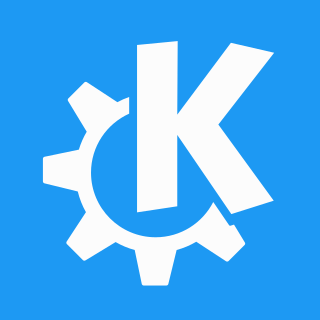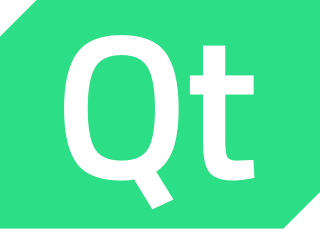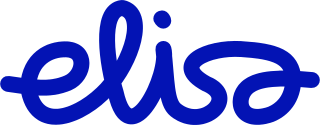
KDE is an international free software community that develops free and open-source software. As a central development hub, it provides tools and resources that allow collaborative work on this kind of software. Well-known products include the Plasma Desktop, KDE Frameworks, and a range of cross-platform applications such as Amarok, digiKam, and Krita that are designed to run on Unix and Unix-like operating systems, Microsoft Windows, and Android.

Qt is cross-platform application development framework for creating graphical user interfaces as well as cross-platform applications that run on various software and hardware platforms such as Linux, Windows, macOS, Android or embedded systems with little or no change in the underlying codebase while still being a native application with native capabilities and speed.
Qt Extended is an application platform for embedded Linux-based mobile computing devices such as personal digital assistants, video projectors and mobile phones. It was initially developed by The Qt Company, at the time known as Qt Software and a subsidiary of Nokia. When they cancelled the project the free software portion of it was forked by the community and given the name Qt Extended Improved. The QtMoko Debian-based distribution is the natural successor to these projects as continued by the efforts of the Openmoko community.
WebKit is a browser engine developed by Apple and primarily used in its Safari web browser, as well as all web browsers on iOS and iPadOS. WebKit is also used by the PlayStation consoles starting with the PS3, the Tizen mobile operating systems, the Amazon Kindle e-book reader, Nintendo consoles starting with the 3DS Internet Browser, and the discontinued BlackBerry Browser.
Fiskars Oyj Abp is a Finnish consumer goods company founded in 1649 in Fiskars, a locality now in the town of Raseborg, Finland, about 100 kilometres (62 mi) west of Helsinki. Fiskars' global headquarters are located in the Arabianranta district of Helsinki.

Elisa Oyj is a Finnish telecommunications company founded in 1882. It was called HPY HTF until July 2000. The mobile operations of Elisa were previously known as Radiolinja.

KDE Software Compilation 4 was the only series of the so-called KDE Software Compilation, first released in January 2008 and the last release being 4.14.3 released in November 2014. It was the follow-up to K Desktop Environment 3. Following KDE SC 4, the compilation was broken up into basic framework libraries, desktop environment and applications, which are termed KDE Frameworks 5, KDE Plasma 5 and KDE Applications, respectively.

K Desktop Environment 1 was the inaugural series of releases of the K Desktop Environment. There were two major releases in this series.

Qt Creator is a cross-platform C++, JavaScript, Python and QML integrated development environment (IDE) which simplifies GUI application development. It is part of the SDK for the Qt GUI application development framework and uses the Qt API, which encapsulates host OS GUI function calls. It includes a visual debugger and an integrated WYSIWYG GUI layout and forms designer. The editor has features such as syntax highlighting and autocompletion. Qt Creator uses the C++ compiler from the GNU Compiler Collection on Linux. On Windows it can use MinGW or MSVC with the default install and can also use Microsoft Console Debugger when compiled from source code. Clang is also supported.

Symbian is a discontinued mobile operating system (OS) and computing platform designed for smartphones. It was originally developed as a proprietary software OS for personal digital assistants in 1998 by the Symbian Ltd. consortium. Symbian OS is a descendant of Psion's EPOC, and was released exclusively on ARM processors, although an unreleased x86 port existed. Symbian was used by many major mobile phone brands, like Samsung, Motorola, Sony Ericsson, and above all by Nokia. It was also prevalent in Japan by brands including Fujitsu, Sharp and Mitsubishi. As a pioneer that established the smartphone industry, it was the most popular smartphone OS on a worldwide average until the end of 2010, at a time when smartphones were in limited use, when it was overtaken by iOS and Android. It was notably less popular in North America.

Accounts & SSO, accounts-sso, or lately gSSO is a single sign-on framework for computers.
The Qt Project is an open collaboration effort to coordinate the development of the Qt software framework. Initially founded by Nokia in 2011, the project is now led by The Qt Company.
LocalBitcoins was a peer-to-peer bitcoin exchange platform based in Helsinki, Finland.

KDE Projects are projects maintained by the KDE community, a group of people developing and advocating free software for everyday use, for example KDE Plasma and KDE Frameworks or applications such as Amarok, Krita or Digikam. There are also non-coding projects like designing the Breeze desktop theme and iconset, which is coordinated by KDE's Visual Design Group. Even non-Qt applications like GCompris, which started as a GTK-based application, or web-based projects like WikiToLearn are officially part of KDE.
Space Systems Finland (SSF) is a Finnish software and systems engineering company. Since its founding in 1989, the company has developed software and systems for several European Space Agency spacecraft.

Solar Foods is a producer of single cell protein founded in 2017.

Fingersoft is a Finnish video game developer based in Oulu. Fingersoft is one of the most northern game studios in the world, located just 170km south of the Arctic Circle. It is best known for the mobile games Hill Climb Racing and Hill Climb Racing 2, which together have over 2 billion installations.

Katja Keitaanniemi is the CEO of OP Corporate Bank, which is the most significant subsidiary of OP Financial Group. According to Corporate Finance Institute, OP Corporate Bank is among the top corporate banks in Finland. Keitaanniemi has been on the list of Finland's most powerful female executives by the business weekly Talouselämä in 2020, 2021, 2022 and 2023.
CoreHW is a Finnish fabless semiconductor company that specializes in providing integrated circuits (ICs) and indoor location solutions for various industries.










